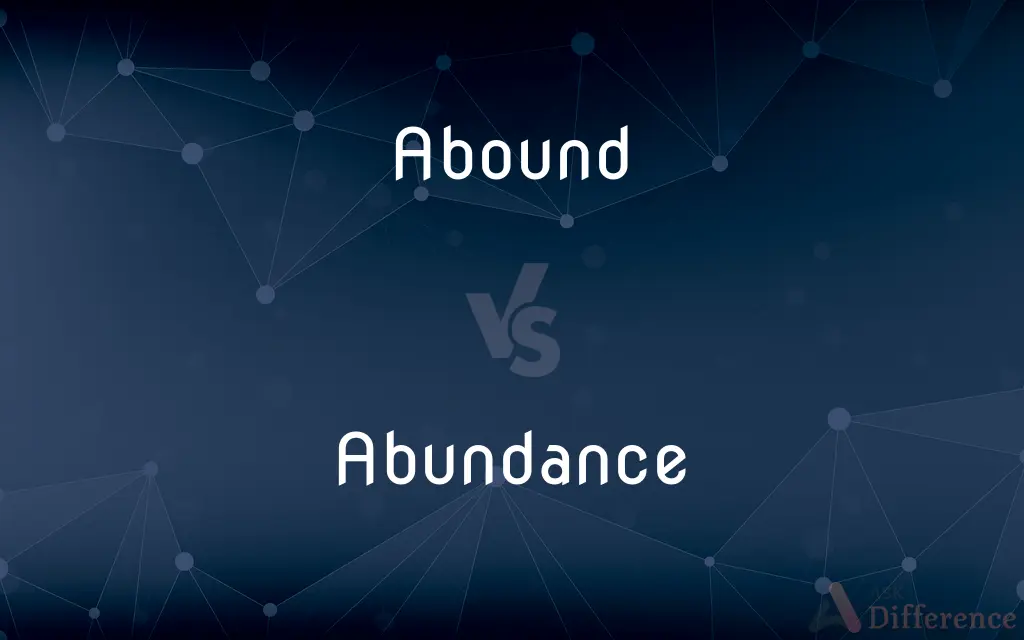Abound vs. Abundance — What's the Difference?
By Urooj Arif & Fiza Rafique — Updated on April 27, 2024
Abound means to exist in large numbers or quantities, while abundance refers to a very large quantity of something.

Difference Between Abound and Abundance
Table of Contents
ADVERTISEMENT
Key Differences
Abound implies an action or state, suggesting that something is plentiful or exists in large numbers. For instance, in spring, flowers abound in the garden, highlighting the natural proliferation of blooms. On the other hand, abundance refers to the state of having a large quantity of something available, such as the garden displaying an abundance of colors and life, emphasizing the result of things abounding.
Abound often relates to the presence or occurrence of something in large numbers dynamically, such as ideas that abound during a brainstorming session. This indicates a continuous process or occurrence. Whereas, abundance signifies a more static condition, like the abundance of ideas collected from a successful meeting, showcasing the outcome of the creative process.
In usage, abound is a verb, suggesting action or existence. For example, during autumn, festivals abound across the country, indicating widespread occurrence. Conversely, abundance is a noun, describing a state or quantity, as seen in the abundance of harvest festivals celebrated during the same season, which represents the culmination of such activities.
Abound can also convey a sense of overflowing or being replete with certain qualities or items, implying a dynamic and ongoing situation. For instance, opportunities abound for those willing to learn new skills. Abundance, meanwhile, captures the scale of what is available or present, such as an abundance of job opportunities in a thriving industry, emphasizing the scale rather than the activity.
While abound is typically used to describe things that are intangible or less quantifiable, such as rumors or happiness, suggesting a qualitative aspect, abundance is used for tangible and quantifiable items, like wealth or resources, stressing a measurable quantity.
ADVERTISEMENT
Comparison Chart
Part of Speech
Verb
Noun
Implication
Suggests proliferation, dynamic presence
Indicates a large quantity, static condition
Usage Context
More abstract concepts (e.g., joy, opportunity)
Concrete and measurable items (e.g., food, money)
Connotation
Activity or process (something happening)
Result or state (something existing)
Typical Objects
Intangible or less quantifiable (e.g., opportunities, ideas)
Tangible or quantifiable (e.g., resources, wealth)
Compare with Definitions
Abound
To be full; teem.
The rivers abound with fish.
Abundance
Copiousness of supply; overflow.
Thanks to the rainy season, there was an abundance of water.
Abound
To increase in number or amount.
As the holiday season approaches, festive decorations abound in the shops.
Abundance
The state of having more than enough of anything.
The region enjoys an abundance of sunshine.
Abound
Be rich or well supplied (usually followed by 'in' or 'with').
The library abounds in classic literature.
Abundance
Wealth; plentifulness.
The ancient city was known for its abundance of gold.
Abound
To be plentiful.
Opportunities for employment abound in the city.
Abundance
Fullness to overflowing.
Her heart was filled with an abundance of love.
Abound
Exist in large numbers or amounts.
In the spring, the fields abound with flowers.
Abundance
A very large quantity of something.
The market had an abundance of fruits and vegetables.
Abound
To be great in number or amount
"In areas where scorpions abound, spider populations are generally kept in check" (Natalie Angier).
Abundance
A great or plentiful amount
An abundance of rain.
Abound
To have something in great numbers or amounts. Often used with in or with
"Neanderthal sites ... abound with artifacts, including scrapers, choppers, hand axes, and knives" (Philip and Carol Zaleski).
Abundance
The condition of being in rich supply
Bananas growing in abundance.
Abound
(intransitive) To be full to overflowing.
Abundance
Degree of plentifulness
"Species of low abundance are ignored in the calculation of predominance" (William M. Lewis).
Abound
To be wealthy.
Abundance
(Chemistry) The amount of an isotope of an element that exists in nature, usually expressed as a percentage of the total amount of all isotopes of the element.
Abound
(intransitive) To be highly productive.
Abundance
Affluence; prosperity
Living in abundance.
Abound
(intransitive) To be present or available in large numbers or quantities; to be plentiful.
Wild animals abound wherever man does not stake his claim.
Abundance
A large quantity; many.
Due to the abundance of art material, the class made a giant collage.
There is not a great abundance of time, so please don't dwadle.
Abound
(intransitive) To revel in.
Abundance
An overflowing fullness or ample sufficiency; profusion; copious supply; superfluity; plentifulness.
Abound
(intransitive) To be copiously supplied
The wilderness abounds in traps.
Abundance
Wealth; affluence; plentiful amount of resources.
Abound
To be in great plenty; to be very prevalent; to be plentiful.
The wild boar which abounds in some parts of the continent of Europe.
Where sin abounded grace did much more abound.
Abundance
Frequency, amount, ratio of something within a given environment or sample.
Abound
To be copiously supplied; - followed by in or with.
Men abounding in natural courage.
A faithful man shall abound with blessings.
It abounds with cabinets of curiosities.
Abundance
(card games) A bid to take nine or more tricks in solo whist.
Abound
Be abundant or plentiful; exist in large quantities
Abundance
(Scotland) enough, sufficiency.
Abound
Be in a state of movement or action;
The room abounded with screaming children
The garden bristled with toddlers
Abundance
An overflowing fullness; ample sufficiency; great plenty; profusion; copious supply; superfluity; wealth: - strictly applicable to quantity only, but sometimes used of number.
It is lamentable to remember what abundance of noble blood hath been shed with small benefit to the Christian state.
Abundance
The property of a more than adequate quantity or supply;
An age of abundance
Abundance
(physics) the ratio of the number of atoms of a specific isotope of an element to the total number of isotopes present
Abundance
(chemistry) the ratio of the total mass of an element in the earth's crust to the total mass of the earth's crust; expressed as a percentage or in parts per million
Common Curiosities
Can abound and abundance be used interchangeably?
No, they cannot be directly interchanged as abound is a verb and abundance is a noun.
In what context might one use abound?
One might use abound to describe the plentiful presence or occurrence of something, like "Ideas abound in a creative workshop."
How can abundance be illustrated in a sentence?
Abundance can be illustrated by describing the plentiful state or amount of something, like "There was an abundance of food at the banquet."
What is a synonym for abundance?
A synonym for abundance is "plenty."
How does the usage of abound and abundance differ in literature?
In literature, abound is used to convey action or presence, such as "metaphors abound in poetry," whereas abundance might describe a setting, like "a landscape of abundance."
What does abound mean?
Abound means to exist in large numbers or to be richly supplied or filled, typically used as a verb.
How can educators explain abound to students?
Educators can explain abound by demonstrating its meaning through examples of things that are plentiful around students, like "During autumn, leaves abound."
What is meant by abundance?
Abundance refers to a large amount of something, typically enough to be more than sufficient, and is used as a noun.
What is the opposite of abound?
The opposite of abound is "scarce."
What is the opposite of abundance?
The opposite of abundance is "scarcity."
What is a synonym for abound?
A synonym for abound is "proliferate."
Can abound have a negative connotation?
Yes, abound can have a negative connotation if it refers to an undesirable proliferation, such as "problems abound."
What practical examples can illustrate abundance?
Practical examples of abundance might include describing a harvest in agriculture or the wealth of resources in a natural setting.
Which is more commonly used in a financial context, abound or abundance?
Abundance is more commonly used in financial contexts to describe wealth or resources.
Does abundance always imply a positive situation?
While often positive, abundance can also refer to excess, which might be negative, such as "an abundance of waste."
Share Your Discovery

Previous Comparison
Prediction vs. Forecast
Next Comparison
Guarantee vs. SecurityAuthor Spotlight
Written by
Urooj ArifUrooj is a skilled content writer at Ask Difference, known for her exceptional ability to simplify complex topics into engaging and informative content. With a passion for research and a flair for clear, concise writing, she consistently delivers articles that resonate with our diverse audience.
Co-written by
Fiza RafiqueFiza Rafique is a skilled content writer at AskDifference.com, where she meticulously refines and enhances written pieces. Drawing from her vast editorial expertise, Fiza ensures clarity, accuracy, and precision in every article. Passionate about language, she continually seeks to elevate the quality of content for readers worldwide.
















































